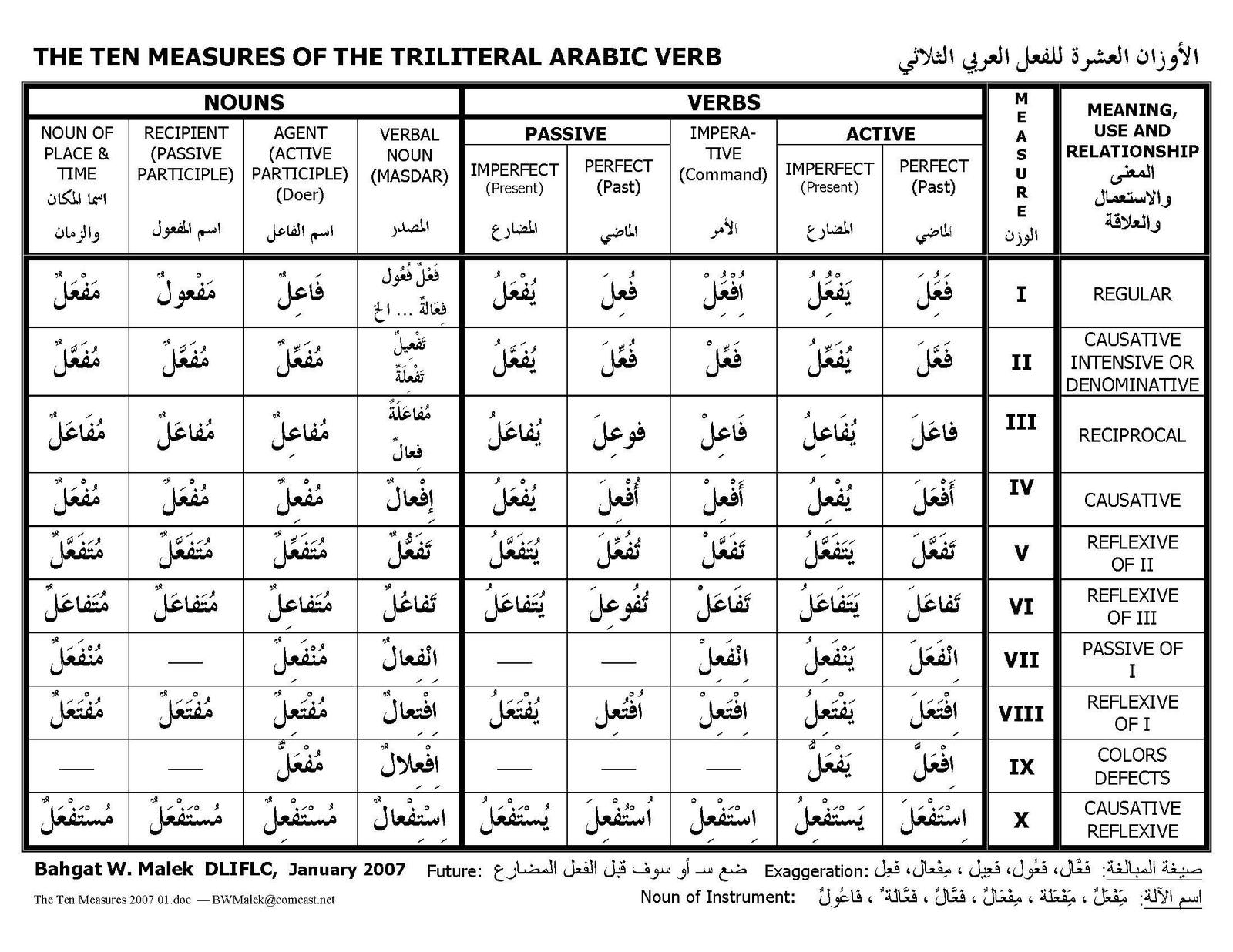10 Arabic Verb Forms (الأَوْزَان العَشَرَة) #
In Arabic, most verbs come from a set of three root letters. These roots can appear in 10 common patterns (called forms). Each form gives the root a slightly different meaning. Learning these helps you understand if something is passive, intensive, repeated, reciprocal, or caused by someone.
🔹 Form I – ٱلْفِعْلُ ٱلثُّلَاثِيّ ٱلْمُجَرَّد (faʿala) #
Pattern: فَعَلَ / يَفْعَلُ / فِعْلٌ
Meaning: The basic/root meaning of the verb
Example: كَتَبَ – He wrote🔹 Form II – ٱلتَّفْعِيل (tafaʿīl) #
Pattern: فَعَّلَ / يُفَعِّلُ / تَفْعِيلٌ
Meaning: Someone makes someone else do the action (causing or intensifying it)
Example: عَلَّمَ – He taught (made someone know)🔹 Form III – ٱلْمُفَاعَلَة (mufāʿalah) #
Pattern: فَاعَلَ / يُفَاعِلُ / مُفَاعَلَةٌ
Meaning: Doing the action with someone else (like talking, helping, fighting)
Example: شَارَكَ – He participated (took part together)🔹 Form IV – ٱلْإِفْعَال (ifʿāl) #
Pattern: أَفْعَلَ / يُفْعِلُ / إِفْعَالٌ
Meaning: To make something happen or to start something
Example: أَسْلَمَ – He submitted (he accepted Islam)🔹 Form V – ٱلتَّفَعُّل (tafaʿʿul) #
Pattern: تَفَعَّلَ / يَتَفَعَّلُ / تَفَعُّلٌ
Meaning: Doing the action to yourself (like learning or getting dressed)
Example: تَعَلَّمَ – He learned (taught himself)🔹 Form VI – ٱلتَّفَاعُل (tafāʿul) #
Pattern: تَفَاعَلَ / يَتَفَاعَلُ / تَفَاعُلٌ
Meaning: Two or more people doing the action to each other
Example: تَشَارَكَ – They shared with each other🔹 Form VII – ٱلِانْفِعَال (infiʿāl) #
Pattern: اِنْفَعَلَ / يَنْفَعِلُ / اِنْفِعَالٌ
Meaning: The action happened by itself or was done to the subject (passive)
Example: اِنْكَسَرَ – It was broken🔹 Form VIII – ٱفْتِعَال (iftiʿāl) #
Pattern: اِفْتَعَلَ / يَفْتَعِلُ / اِفْتِعَالٌ
Meaning: The action is done by the person to benefit themselves or from within
Example: اِشْتَرَى – He bought🔹 Form IX – ٱفْعَلَّ (ifʿalla) #
Pattern: اِفْعَلَّ / يَفْعَلُّ / اِفْعِلَالٌ
Meaning: Used for colours or physical conditions
Example: اِحْمَرَّ – It turned red🔹 Form X – ٱسْتِفْعَال (istifʿāl) #
Pattern: اِسْتَفْعَلَ / يَسْتَفْعِلُ / اِسْتِفْعَالٌ
Meaning: Asking for or trying to do the action
Example: اِسْتَغْفَرَ – He asked for forgiveness
Arabic Verb Forms – Summary Table #
| Form | Arabic Name | Pattern (Past / Present / Masdar) | Meaning | Example Verb (with translation) |
|---|---|---|---|---|
| I | الفِعْل المُجَرَّد | فَعَلَ / يَفْعَلُ / فِعْلٌ | Basic/root meaning | كَتَبَ – He wrote |
| II | التَّفْعِيل | فَعَّلَ / يُفَعِّلُ / تَفْعِيلٌ | Causing or repeating the action | عَلَّمَ – He taught |
| III | المُفَاعَلَة | فَاعَلَ / يُفَاعِلُ / مُفَاعَلَةٌ | Doing the action with someone | شَارَكَ – He participated |
| IV | الإِفْعَال | أَفْعَلَ / يُفْعِلُ / إِفْعَالٌ | To cause or start the action | أَسْلَمَ – He submitted |
| V | التَّفَعُّل | تَفَعَّلَ / يَتَفَعَّلُ / تَفَعُّلٌ | Doing the action to yourself | تَعَلَّمَ – He learned |
| VI | التَّفَاعُل | تَفَاعَلَ / يَتَفَاعَلُ / تَفَاعُلٌ | Doing the action together (mutual) | تَشَارَكَ – They shared |
| VII | الانْفِعَال | اِنْفَعَلَ / يَنْفَعِلُ / اِنْفِعَالٌ | Passive – it happened to the subject | اِنْكَسَرَ – It was broken |
| VIII | الافْتِعَال | اِفْتَعَلَ / يَفْتَعِلُ / اِفْتِعَالٌ | Reflexive or internal benefit | اِشْتَرَى – He bought |
| IX | افْعَلَّ | اِفْعَلَّ / يَفْعَلُّ / اِفْعِلَالٌ | Describing colours or states | اِحْمَرَّ – It turned red |
| X | الاسْتِفْعَال | اِسْتَفْعَلَ / يَسْتَفْعِلُ / اِسْتِفْعَالٌ | Asking for or trying to do something | اِسْتَغْفَرَ – He sought forgiveness |
 #
#
Notes #
- All forms are derived from three-letter roots.
- Verb forms affect the meaning, grammar, and sometimes transitivity.